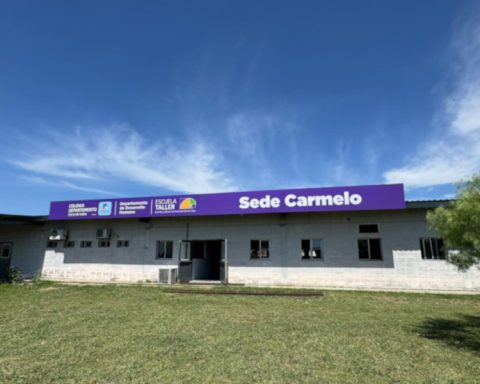Who has not heard about the lack of workers in the technology sector? But in the same way that there is a time for regret, there is another to try to reverse this situation. This is how it is understood by those who are carrying out Uruguay Bootcamp, an intensive training model that, precisely, wants to address the shortage of people with digital skills, estimated at some 3,000 vacant developer positions according to the Uruguayan Chamber of Information Technology (CUTI) .
The system is not new, because experiences have been recorded that have been in the United States for more than a decade; but what is new is the speed of expansion that has been observed in recent years throughout the world, and that now lands in Uruguay with a plan that will be carried out by the National Institute of Employment and Vocational Training (Inefop), and for which it will allocate an initial investment of about $65 million over a period of 24 months. This has a lot to do with the debate on the future of work, says Pablo Darscht, the general director of Inefop.
Facing the debate on the future of work is always an interesting but very complex exercise with countless edges. However, there are situations that are happening today that are clearly showing us something. We live in a digital present, everything suggests that this will be accentuated in the future, and we have a deficit in the professions associated with these issues. How do you respond to this apparent paradox?
Lately I’ve been insisting a lot that we have to talk about the present of work, because the future we’re talking about is already here. And that reality of work means that practically all of us are immersed in the digital transformation of what we do. At the institute we have been working since we arrived on what are the contributions that can be made in training to make it easier for people to acquire digital skills. We have a whole range of interventions in that sense, and now we are launching the Bootcamps program that aims at the top of the pyramid, let’s say.
What does that mean exactly?
Clearly, it is not even imaginable, I think, in the medium-term future, a society where everyone is dedicated to programming computers. What happens is that as more and more programmers are needed, many job opportunities appear there. This is a complementary and different situation, because it is the other side of that generalized need for everyone to acquire basic digital skills. We are addressing that with other instruments.
Is Uruguay Bootcamp going to a specific segment, of people who already have some of these skills, then?
Of course, what we are proposing is how we can help so that part of those 3,000 vacancies for programmers that CUTI proposes can be filled by people who are not necessarily in the middle of a university career to be computer or telecommunications engineers, but people who look with affection at the possibility of working in this sector, but already with a basic training of high school or even a traditional profession, such as an accountant or sociologist, lawyer, etc. In other words, people who want to retrain and are interested in reinserting themselves into the information technology job market, but cannot afford to spend three or four years studying these issues in order to enter the workforce. That is the segment we are targeting, whether it is young people or people who are in any part of their working life, and who like this possibility. These bootcamp programs are proving to the world that they are ideal so that in periods of three to six months of very intensive training – the day is dedicated to it – a standard is reached that is interesting for companies that are desperately seeking this expertise.
With face-to-face, virtual, hybrid training?
That depends on each of the bootcamps that we accredit. Here in Uruguay, Holberton School, Hack Academy, Senpai Academy and UTEC are accredited. In the case of Holberton, it is a hybrid, although more inclined to the face-to-face, and in the others more virtual, which seems very interesting to me because of the arrival to the interior.
The high rates of labor insertion are the greatest stimulus, surely.
The examples of bootcamps that we have in Uruguay manage the number of job placements as above 80%, which for us, at Inefop, sounds like music, because that is our job: trying to get people not only to be trained, but also to with that training get a job. So if 8 out of 10 who try succeed, it’s an almost risk-free bet.
How do you interact with the IT industry to add people to organizations? How does this back and forth happen?
We have been watching and analyzing very carefully the experiences in the world regarding bootcamps, and the public policies that use bootcamps for the same purposes that we want to develop ourselves. And it seemed to us that the model is a complex whole, where the secret to success is to try to distort as little as possible.
How is that?
That is, try not to do things that remove or add incentives that are not what we want, because the system, as it is, works. That is why the approach we take is the following: we think that the tool is valuable, in fact in Uruguay today there are four bootcamps or organizations that provide this type of training with good success. And that is already a limitation, because if we only work with those four, we do not reach the number of graduates that we want. Therefore, one of the objectives of the program is to attract first-rate, world-class bootcamps that come to Uruguay to offer their services. Now, to find out who is and who is not, we have designed an accreditation process for the bootcamps at Inefop, for which we are working with industry leaders, several of whom are directors of the Uruguayan Chamber of Information Technologies (CUTI ), but in general they are entrepreneurs recognized by their peers in Uruguay, to whom we ask in an accreditation process, to indicate if they or their companies would hire the graduates of a certain bootcamp. If the answer is affirmative –which is not a binary answer either, but rather the conclusion of the analysis they make of the pedagogical proposal– and these bootcamps have a history, they pass to accredited status. An agreement is signed there and we tell them “work as if Inefop did not exist”. And there we ask them to get students. It must be said that one of the characteristics of bootcamps is that the student selection processes are quite rigorous, but this is what allows them to guarantee that the success rate will later be good.
Always on the basis that the students have a certain base. What benefits do they get if they are selected?
Yes, there are certain basic requirements, a certain capacity for logical thinking, certain minimum knowledge or familiarity, I would say, with computer science, that these bootcamps check. The candidates who are admitted can go to Inefop to request a scholarship, and there is the contribution of the institute. The goal of the scholarship is for people to be able to live during the months that the training lasts. Bootcamps around the world, and also here in Uruguay, offer the possibility that the cost of training is paid once people enter the workforce.
Let’s go deeper there.
We say “Do you want to do the bootcamp?”. Very well. So there we sign a contract and tell them that when they achieve job placement based on what they learned, they begin to repay this training. There, people from a medium-low socioeconomic status receive monthly support from the institute, which they can use to pay part of the tuition or for maintenance, we don’t get involved in that.
There are $65 million in 24 months that are allocated to this initiative, how many people does it impact?
With this program we hope to increase the supply of bootcamp seats in Uruguay. We propose that in the next two years 1,000 people graduate. Of those 1,000 people, we propose that the scholarships reach 400. In other words, our objective is to support 400 people, but the point is that the opportunity opens up for many more. This is the first line of the program, but there is a second, because we saw during the preparation of this, while talking with people from the business sector, that they are not only interested in hiring those who come out of the bootcamps, but also in articulating training Similar but internally. They say they prefer to recruit candidates, train them for three to six months, and have them work on the staff.
And what is the role of Inefop there?
To companies that have this approach to recruitment, we offer subsidies of 70% of the cost of that training, and the cost includes the salaries paid to students, because the model means entering the company, where you start to receive remuneration from the first day, but with those first months of training. So, the cost that this salary implies is equivalent to the scholarship that we pay in the other cases.
Is there local experience of this model?
We did some experience that is very similar to what we are looking for, and it was with the Globant company during the year 2020. This is a very interesting story because Globant did not do “game testing” or test computer games in Uruguay, but rather did for example in Argentina with a face-to-face activity. At a time when Uruguay was open in a pandemic and the Argentines were closed, they considered it interesting to bring them to Uruguay. They presented us with a project to open this branch of business in Uruguay, which involved co-financing with the participation of Inefop for more than 200 people – almost all of them young – who finally ended up hired by Globant. This is the scheme that we are sponsoring in parallel with the scholarships. They are the two lines of work of the program.

















